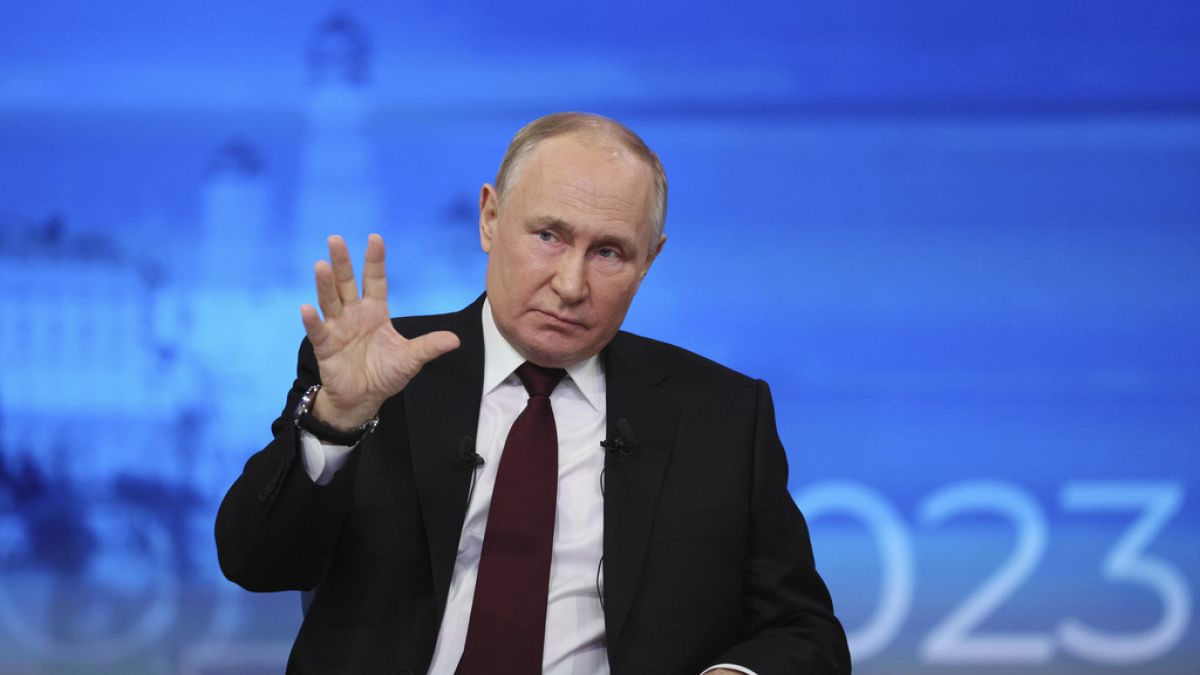
Russian President Vladimir Putin has said there will be no peace in Ukraine until his goals are achieved – and said those objectives remain unchanged.
Putin was speaking at a year-end news conference on Thursday which offered the leader an opportunity to reinforce his grip on power.
Giving rare detail on what Moscow calls its special military operation, Putin dismissed the need for a second wave of mobilisation of reservists to fight in Ukraine – a move that proved deeply unpopular in the past.
He said there are some 617,000 Russian soldiers currently there, including around 244,000 troops who were called up to fight alongside professional Russian military forces.
The Russian president, who has held power for nearly 24 years and announced recently he is running for reelection, was greeted with applause as he arrived in the hall in central Moscow.
Putin did not hold his traditional press conference last year after his military failed to take Kyiv while the Ukrainian army retook swaths of territory in the east and south of the country.
But with Ukrainian President Volodymyr Zelenskyy now forced to plead for more US aid, a stalling counteroffensive and reports of fracturing Western support for Ukraine, the Russian president has decided to face the media once more.
It seems, though, that the broadcast remained heavily choreographed and more about spectacle than scrutiny.
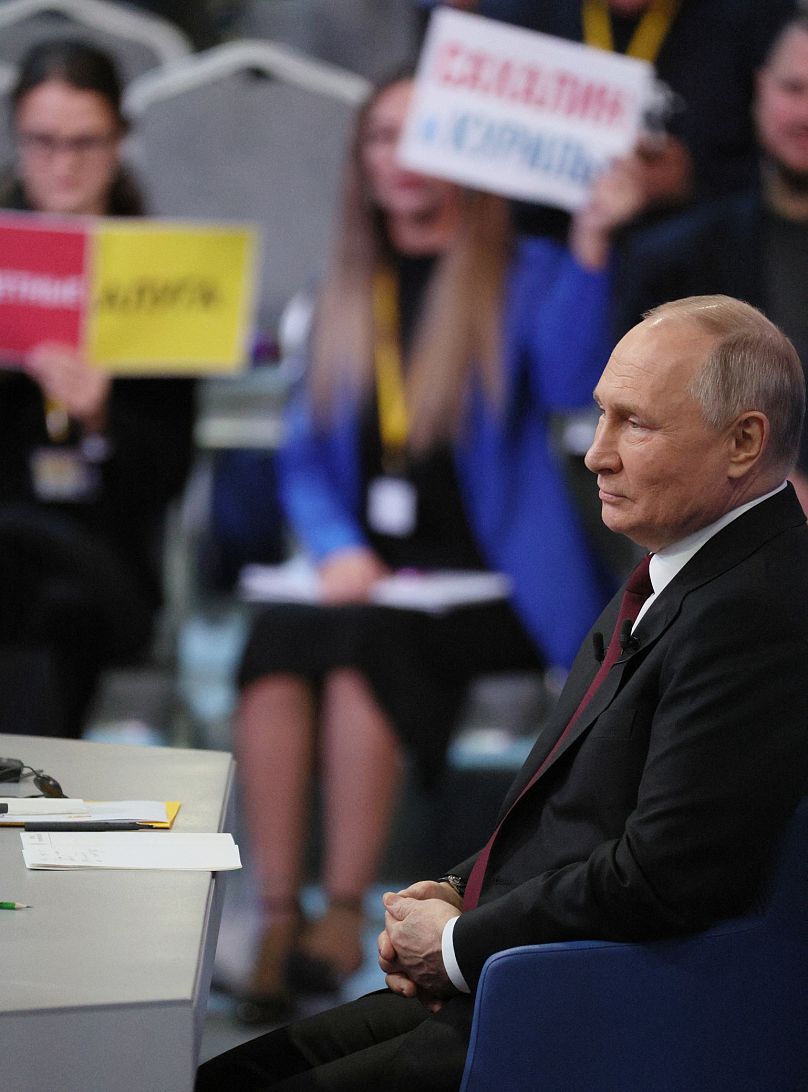
This year, ordinary citizens had the chance to phone in questions along with those asked by journalists – and Russians submitted queries for Putin over a two week period.
It was the first time Putin, who has heavily limited his interaction with foreign media, has faced multiple questions from Western journalists since the fighting in Ukraine began.
The press conference opened with questions about the conflict in Ukraine and highlighted concerns some Russians have about fears of another wave of mobilisation. In September 2022 Putin ordered a partial military call-up as he tried to boost his forces in Ukraine, sparking protests.
“There is no need,” for mobilisation now, Putin claimed, because 1,500 men are being recruited into the Russian army every day across the country. He said, as of Wednesday evening, a total of 486,000 soldiers have signed a contract with the Russian military.
Putin reiterated that Moscow’s goals in Ukraine – “de-Nazification, de-militarization and a neutral status” of Ukraine – remain unchanged.
He spelled out those loosely defined objectives the day he sent troops to the country in February 2022.
“De-Nazification” refers to Russia’s allegations that the Ukrainian government is heavily influenced by radical nationalist and neo-Nazi groups – claims derided by Kyiv and the West.
Putin has also demanded that Ukraine remain neutral – and not join the NATO alliance.
“There will be peace when we will achieve our goals,” Putin said, repeating a frequent Kremlin line.
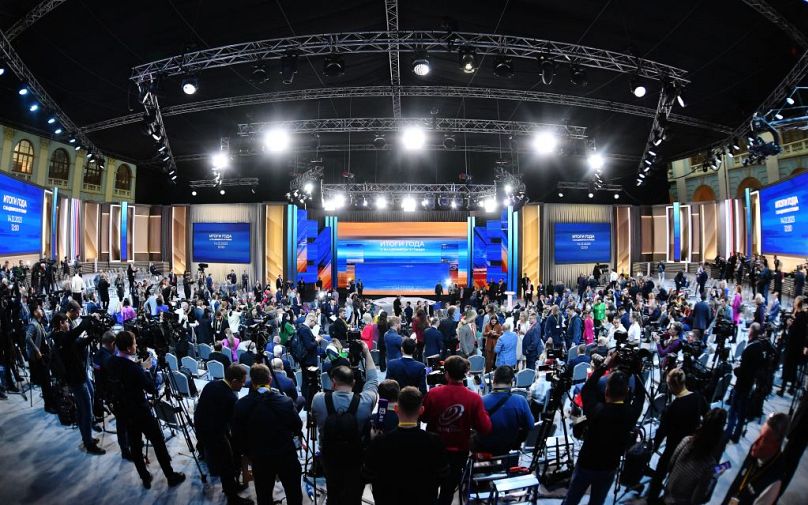
His appearance was primarily aimed at a domestic audience and is a chance – performative or otherwise – for him to personally resolve the problems of ordinary Russian citizens ahead of the 17 March election.
Putin fielded questions on Thursday from a group of children in Russian-annexed Crimea concerned about the leaking roof and mould in their sports hall as well as from a woman who addressed him as “my favourite president,” to complain about the spiking price of eggs.
State media said that as of Wednesday, about 2 million questions for Putin had been submitted ahead of the broadcast.
Journalists lined up for hours in freezing temperatures to get into the venue and some donned traditional dress, including elaborate hats in order to catch Putin’s attention. Many journalists also hold placards, prompting the Kremlin to limit the size of signs they can carry during the news conference, which often lasts about four hours.
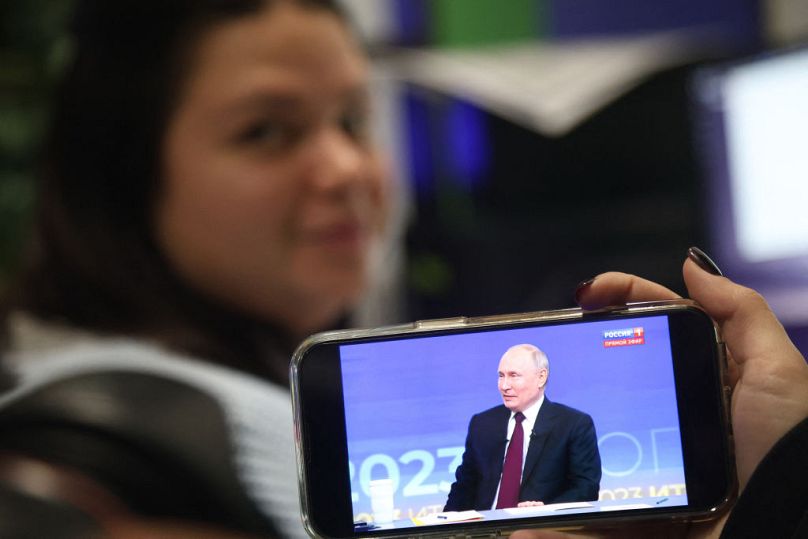
Is Putin a shoo-in at the next election – and where is Navalny?
In the absence of real opposition, methodically eradicated by the Kremlin, Putin’s victory in March 2024 seems obvious.
The conference comes at a time when his main detractor, the imprisoned anti-corruption activist Alexeï Navalny, has not been heard from for more than a week.
Last known to be serving a 19-year prison sentence for “extremism”, nobody has been able to track him down.
There are rumours that he may have been transferred to a penal colony with even harsher conditions, potentially an effort by the Kremlin to tighten his isolation as Putin fights his presidential campaign.
Earlier this week, worries spread about Navalny’s whereabouts after officials at the prison facility east of Moscow said he was no longer on the inmate roster.
Navalny’s spokeswoman Kira Yarmysh confirmed that his associates and lawyers have been unable to contact him for a week. Prison officials claim he has been moved from the jailhouse – but didn’t give further details.
Although from a Western perspective it sounds suspicious, prison transfers in Russia are notoriously secretive.
Authorities rarely provide information about the whereabouts of inmates for weeks until they reach another facility and are given permission to contact relatives or lawyers.
Earlier this year, another prominent opposition figure, Andrei Pivovarov, also went missing during a prison transfer. His transfer, from a detention centre in Russia’s southern region of Krasnodar to a penal colony in the northwestern region of Karelia, took about a month.
Once at a new facility, prison officials there are legally obliged to notify relatives or lawyers within 10 days, but Kira Yarmysh said they can hardly be expected to follow the rules in Navalny’s case.
“They will try to hide him as long as possible,” she explained to the AP.
“I guess this was made deliberately to isolate Alexei during this period of time so he wouldn’t be able to influence all these things in any way, because everyone understands – and Putin, of course, understands – that Alexei is his main rival, even despite the fact that he is not on the ballot.”
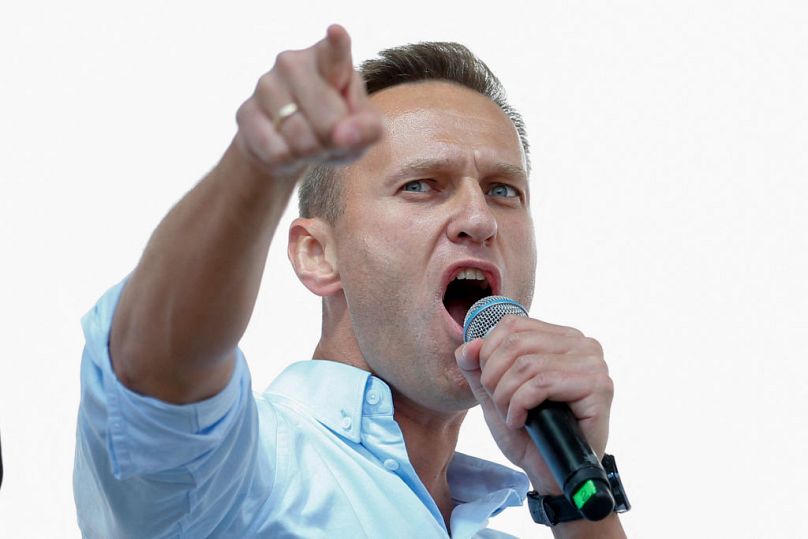
Asked on Tuesday where Navalny is, Kremlin spokesman Dmitry Peskov snapped that “we have neither a desire nor an opportunity to track down inmates.”
Commenting on US expressions of concern about Navalny, Peskov said in a conference call with reporters that he has been convicted and is serving his sentence, adding that “we consider any interference, including by the United States, inadmissible.”
Navalny, 47, has been behind bars since January 2021, when he was arrested upon his return from Germany where he had recuperated from nerve agent poisoning that he blamed on the Kremlin.
Navalny, who campaigned against official corruption and organised major anti-government protests, has rejected all charges against him as a politically motivated vendetta.
The loss of contact with Navalny was particularly worrying, given that he recently fell ill, Yarmysh said. She said prison officials had given him an IV drip when he felt dizzy and he had to lie on the floor of his cell.
While Putin’s reelection is all but certain, given his overwhelming control over the country’s political scene and a widening crackdown on dissent, Navalny’s supporters and other critics hope to use the campaign to erode public support for the Kremlin leader and his military action in Ukraine.
Since the start of his imprisonment, he has continued his scathing attacks on the Kremlin in comments his associates posted to social media.
“I guess they decided that it would be smarter for them to send him as far away because he’s still too loud and too present in the public field,” Yarmysh said.





